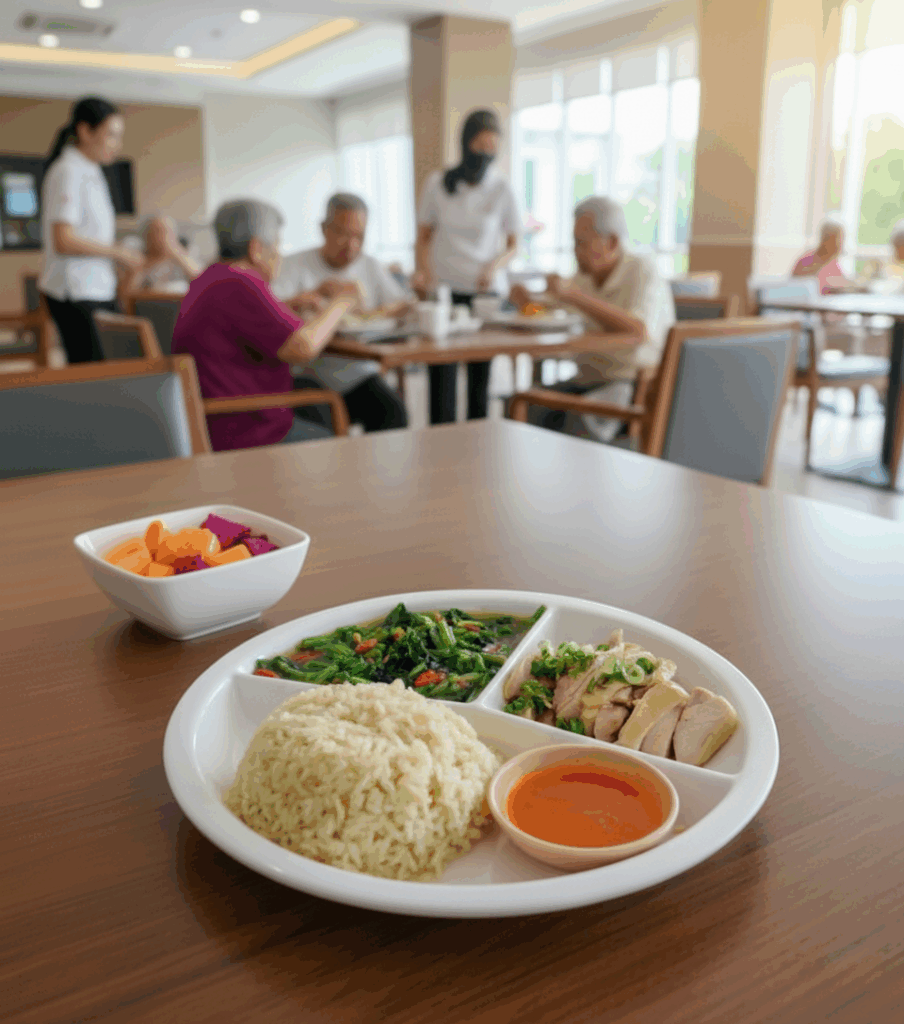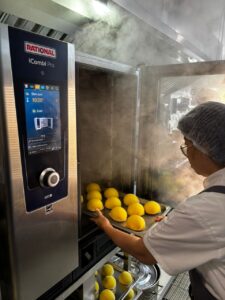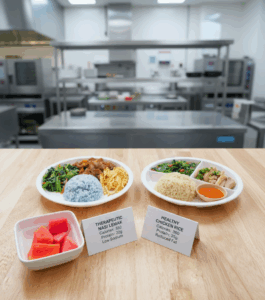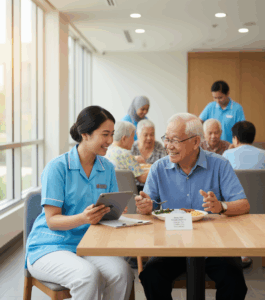BIGTREE Medicare & Nursing Home
Need help? Call Us Now : +6012 685 5103
Need help? Call Us Now : +6012 685 5103
The Kitchen That Heals: How BIGTREE Transformed Dreaded Hospital Food into Therapeutic Cuisine That Residents Actually Crave
- Home
- The Kitchen That Heals: How BIGTREE Transformed Dreaded Hospital Food into Therapeutic Cuisine That Residents Actually Crave
The Kitchen That Heals: How BIGTREE Transformed Dreaded Hospital Food into Therapeutic Cuisine That Residents Actually Crave
At BIGTREE Medicare & Nursing Home, food isn’t just sustenance—it’s medicine, therapy, and hope served four times a day
The Quiet Revolution Happening at Mealtimes
In most healthcare facilities, mealtimes are scheduled events. At BIGTREE Medicare & Nursing Home, they’ve become something unexpected: the highlight of residents’ days. So much so that meal times keep getting earlier and earlier because residents eagerly anticipate their next plate—making it imperative for our team to ensure every dish is worth their excitement.
This isn’t just about good food. It’s about what happens when a Malaysian nursing home decides to completely reimagine therapeutic nutrition, creating something virtually impossible to replicate unless you’re willing to fundamentally reimagine healthcare as a deeply human, relationship-based endeavor rather than a standardized institutional service.
Beyond Hospital Food: The BIGTREE Medicare Way

“We’ll never make Michelin guides or dining lists,” explains our therapeutic catering partner at Balanced Kitchen with characteristic honesty. “Our success isn’t measured by food critics—it’s measured by empty plates returned, improved clinical outcomes, and residents recovering enough to go home to their families.”
This philosophy drives everything at BIGTREE, where our proven partnership with Balanced Kitchen creates comprehensive therapeutic nutrition that’s making a real difference for residents. Four meticulously crafted meals are prepared daily on-site, each designed not just to nourish, but to actively heal.

What makes this special? Everything—from main meals to pastries for tea time—is prepared fresh on our premises, never catered from outside. Our menus are planned weeks ahead and reviewed monthly to ensure variety and prevent institutional monotony. This gives us complete control over ingredients, preparation methods, and quality standards, allowing real-time adjustments based on residents’ changing needs.
Working alongside our dedicated in-house nutritionist and medical team, we create therapeutic meals addressing specific conditions: specialized renal diets for kidney health, precise gout management protocols, diabetic-friendly options that don’t sacrifice flavor, and high-protein regimens optimized for muscle maintenance and wound healing.
The Cultural Challenge: Making Nasi Lemak Therapeutic
Creating nutritionally balanced versions of beloved Malaysian dishes requires both culinary creativity and deep cultural understanding. Our therapeutic nasi lemak uses heart-healthy coconut oil and generous portions of carefully selected vegetables, maintaining authentic flavors while actively supporting residents’ health goals. Our chicken rice comes with precisely balanced portions satisfying both strict nutritional requirements and cultural expectations.

In Melaka—recently ranked as Malaysia’s second most obese state and a UNESCO World Heritage food haven—this approach proves that respect for food culture and medical excellence aren’t competing priorities. They’re complementary pathways to better health outcomes, especially crucial as Malaysia transitions to an aging nation by 2030.
The Human Touch That Changes Everything
What truly sets BIGTREE apart is our continuous, personalized feedback loop. Our in-house nutritionist doesn’t just plan meals—she personally visits with residents during and after each meal, observing consumption patterns, listening to preferences, and monitoring how nutrition impacts recovery.
When residents aren’t eating well, our team immediately investigates like medical detectives. Perhaps the texture needs adjustment for easier swallowing, the seasoning doesn’t suit their palate, or underlying medical changes are affecting appetite. These seemingly small details matter profoundly because they directly impact recovery outcomes.
The proof of our quality? Our own staff members working throughout our integrated facilities regularly order these therapeutic meals for themselves. Even more telling, former residents who have recovered and returned home continue to request our food delivery after discharge—something we never originally intended to offer, but if it means we can continue helping families maintain proper nutrition at home, why not?
Mr. Ming’s Story: When Food Becomes Hope
No story better illustrates our approach than Mr. Ming, a stroke survivor who arrived with an NG tube and tracheostomy, unable to eat normally. Working tirelessly with speech therapists, our nutritionist checked his intake at nearly every meal, making countless texture modifications as he slowly regained his ability to swallow.
As Mr. Ming’s communication improved, he began writing out what he wanted to eat and specifying the exact texture he could safely manage. Even when his diet consisted primarily of kuey teow soup for weeks—because that allowed him to safely practice swallowing while maintaining dignity—we supported his choice completely.
When Mr. Ming returned home months later, he could once again enjoy his favorite hee kiow mee with his family—a testament to treating food as therapy rather than just institutional sustenance.
Measuring What Matters: The Details That Transform Care

When our nutritionist sits with residents during meals, these conversations reveal insights no digital system could capture: the elderly gentleman who leaves vegetables untouched might prefer them prepared with familiar childhood spices, or the resident eating less might be struggling with medication-related texture difficulties.
In Malaysian society, where food carries deep cultural significance and family connection, maintaining therapeutic nutrition without sacrificing cultural identity requires constant attention to these human nuances. Modern Malaysian families increasingly understand the vital connection between quality ingredients, thoughtful preparation, and health outcomes—expecting therapeutic meals that honor heritage while supporting recovery.
The Ripple Effect: What Families Notice
When families visit BIGTREE, they immediately notice mealtimes aren’t rushed institutional affairs but opportunities for social connection and therapeutic intervention. Residents who struggled with appetite at other facilities begin eating better within days. Those with swallowing difficulties find textures and flavors that work safely. Cultural preferences are honored while medical needs are meticulously met.
This attention to detail creates what families consistently describe as profound peace of mind—knowing their loved one’s individual needs, preferences, and dignity are noticed, respected, and skillfully accommodated every single day.
A Standard Worth Replicating
 At BIGTREE, we operate by a simple principle: we provide care we’d proudly offer our own family members. This standard pushes every aspect of our operations toward excellence—from clinical protocols to the simple act of sitting with residents during meals and truly listening.
At BIGTREE, we operate by a simple principle: we provide care we’d proudly offer our own family members. This standard pushes every aspect of our operations toward excellence—from clinical protocols to the simple act of sitting with residents during meals and truly listening.
Our approach represents something larger than BIGTREE: it’s a model for how Malaysian healthcare can honor both medical excellence and cultural values. It’s proof that institutional care need not mean impersonal care, and that therapeutic nutrition can be both medically sophisticated and culturally authentic.
For families across Malaysia navigating eldercare challenges, this offers genuine reassurance that world-class medical care and deeply personal attention aren’t mutually exclusive. At BIGTREE, this vision isn’t just aspiration—it’s served daily, one meaningful conversation at a time, one perfectly adjusted meal at a time, one successfully recovered resident at a time.
BIGTREE Medicare & Nursing Home – Malaysia’s trusted partner in comprehensive eldercare and medical services, where professional healthcare meets family-centered compassion.
Ready to experience therapeutic nutrition that your loved one will actually look forward to? Schedule a personalized consultation to discuss your family’s healthcare needs and discover how our approach to food as medicine can support recovery and wellbeing.
Contact BIGTREE Medicare & Nursing Home:
- Phone: +6012 685 5103
- Website: www.bigtree.care
- Email: info@bigtree.care
- Location: 1, Jalan Pinggiran Kota Laksamana, Pusat Perniagaan Kota Laksamana Jaya, 75200 Melaka
Our Therapeutic Nutrition Partner – Balanced Kitchen:
- Phone: +60 11-5914 4931
- Specializing in: Therapeutic meal planning, nutritionist-guided nutrition, and accessible healthy meals for healthcare facilities
Visit our facility to see firsthand how mealtimes can become the highlight of your loved one’s day.


Leave A Comment